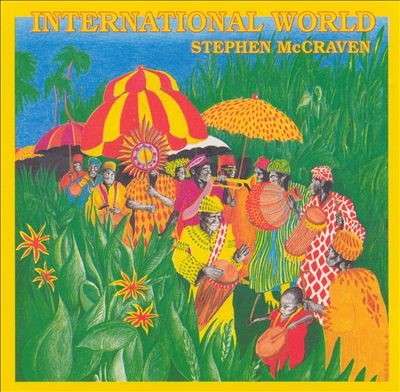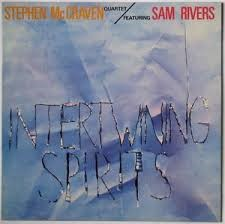Inter - section
In 1991, Marion Brown composed the liner notes for Stephen McCraven’s third album, International World. ‘The musicians on this album are not exactly household names’, he concedes, but their credentials can easily be heard.[1] Listening to saxophonist Chris Merz, for example, ‘one gets the impression that he grew up in one of those communities where jazz and black life abounds’.[2] Of McCraven himself, Brown divulges slightly more information: ‘Steve is a constantly evolving musician … he is beginning to make his move to leadership … he shows growth and mastery of the instrument and of the group. He is ready … you’ve got to hear this music to see and experience Steve’s joy of life’.[3]
Two concepts are clear from Brown’s instructive description: an ever-developing sense of the musicians’ Self that is historically, culturally, socially and musically contingent, a snapshot of which is displayed to the listener of the synchronic recorded artefact; and an ever-developing sense of community that grows within, between and through interconnected subjectivities.[4] One can unpick the implications of Brown’s observations as those which occupy the parallax space between subjectivity and community: synergistically displacing the difference between the two positions (universal and particular) into each other.[5] To elaborate rhetorically, Self and Community is analogous to ideas in quantum physics – notions of superposition or wave-particle dualisms. In order to overcome static juxtapositions of dichotomies when approaching these ideas, one must no longer consider them oppositions but tensions or a gap.
To Brown these ideas of Selfness and Community are clearly not antithetical. One does not take primacy over another, rendering either self-ness or social matrices epiphenomenological to the other; nor are they two sides of one coin – irreconcilable owing to their distinct, seemingly disparate ontological conditions. To Brown, the ideas are wholly interdependent. Hidden among praise of his fellow musicians, Brown hits upon questions of growth of Self and its impact on others, the direct impact of environments on the a musician’s performance and the implication of music as a direct conduit to experience of the Other.
Selfness, in improvisation, becomes a universal singularity. The position is cosmopolitan and draws on Kant’s question ‘What is Enlightenment?’[6] The universal drawn from Selfness is not based – as in Hegel’s notion of ‘world-civil-society’ on particular geopolitical or geolocalities, for example, but rather is a Self who bypasses the mediation of these particulars in order to engage directly with a universality.[7] Self in improvisation as universal does not aim to identify with encompassing global systems, but universal ethico-principals – which are all accessible to anyone. While many improvisers suggest a hereditary or culturally fixed origin of their musics, the principals of the creation of their work is egalitarian.[8] It is this jump that refers to the ‘public’ versus ‘private’ paradox in Kant: one participates in the ‘public’ sphere wholly as a ‘private’ Self, and one cannot exist without the other.
Is this not what Anthony Braxton was drawing attention to when he called for a move toward the mythological realm?[9] Deliberate returns to metahistorical doctrines of universal absolutes and movements away from the privitisation of ideas and beliefs?[10] Can we not identify with ease the target of this critique, the ‘privitisation of public space’?[11] David Cameron is photographed and interviewed casually at home with his family (‘cinéma vérité’); palace approved candid photographs of young children grace newspaper front pages; celebrities and politicians are shown tacitly canoodling while on holiday. Žižek sees in this trend an obliteration of the symbolic realm, wherein symbolic entities are reduced to ‘a bundle to intimate properties, desires, traumas, idiosyncrasies’.[12] There is a large element in this dialectical shift of the Master wishing not to appear as Master to the Slave – ‘oh, he is just like us, he cannot be so bad etc…’.[13] His relentless and stochastic rhetoric make it hard to disagree with Žižek here, but more could be said about this journalistic and cultural phenomenon: that is crystallises and is synecdochal for that against which a drive towards new mythology rails. Namely, a total atomisation of Self, even in the highest (public) symbolic realm. Appeals to similarity with others is not an appeal to a metahistory, but the antithesis – an appeal to the essential individual, to the object. Perhaps the point is best demonstrated in practice, by one who could be considered its founding father, the ‘Teflon president’ Ronald Raegan:
A few months ago I told the American people I did not trade arms for hostages. My heart and my best intentions still tell me that's true, but the facts and the evidence tell me it is not.[14]
What McCraven, Brown and Braxton advocate is a Community of Intertwining Spirits, multiple subjectivities which develop beyond immediate circumstance through a mutual interaction within the perimeters of relative absence/presence. In the language of the academy, improvisation arises in and as ‘social’ practices and their ‘structural’ relations to each other.[15] A potentially infinite composite of ‘social’ relations on a micro and macro level; a live field of ‘social’ production, of acquired ‘cultural’ capital, mutually and perpetually (re)conditioned.[16]
‘Art and individuality are inextricably connected: the wider question … is how the divide between the public and private manifests itself’.[17] Group improvised music is a synthesis of several immediate Selves, an empathetic experience, wherein sound becomes the manifold movements of consciousness as states of life.[18] ‘It is the exhilaration of finding oneself … there is no product, no final solution … only the unending process of exploration’.[19] Phenomenologically, it’s ‘just get up and play. But it all had to do with the musical environment. You have to get some kindred spirits … always concerned with freedom’.[20]
A friend of mine once asked Neil Cowley if he taught. He replied, shocked, ‘of course not – I’ve no idea what I’m doing when I play!’.
when you start to play off the top of your head, that’s when the truth is really known about people.[21]
[1] Marion Brown: Liner notes to Stephen McCraven: International World. 1991, ASP Records.
[2] Ibid.
[3] Ibid.
[4] I use Self when in relation to the development of subjectivity.
[5] Id est. two closely linked perspectives between which no common ground is shared. Not a Kantian antinomy, which cannot be dialectically sublated, but an oscillating shift in perspective that allows dialectic al materialism to progress. I use Slavoj Žižek’s elaboration of the term and its implications. Žižek, The Parallax View (Cambridge: MIT Press, 2009), 3-13 provides the conceptual overview from which I draw.
[6] Immanuel Kant, An Answer to the Question: What is Enlightenment?, translated by H. Nisbet (London: Penguin, 2009).
[7] See: Kojin Karatani, Transcritique: On Kant and Marx (Cambridge: MIT Press, 2003), 34; Slavoj Žižek, ‘The Parallax View’, October 9, 2006, accessed April 30, 2016, https://libcom.org/library/the-parallax-view-karatani-s-transcritique-on-kant-and-marx-zizek.
[8] Eg., Yusef Lateef, Yusef Lateef’s Method on How to Improvise Soul Music (Teaneck: Alnur Music, 1970).
[9] Art Lange, liner notes to Ensemble (New York) 1995, by Anthony Braxton, BMI, 1995, BH007; Mike Heffley, The Music of Anthony Braxton (London: Routledge, 2006), 413-4.
[10] Metahistorical as: ideologies that assign to history a goal and a direction. See: Octavio Paz, ‘In Search of the Present’, Nobel Lecture, December 8 1990, translated by Anthony Stanton, accessed June 12 2016, http://www.nobelprize.org/nobel_prizes/literature/laureates/1990/paz-lecture.html.
[11] Slavoj Žižek, ‘The Act of Killing and the modern trend of “privatising public space”’, New Statesman, July 12 2013, accessed June 12 2016, http://www.newstatesman.com/culture/2013/07/slavoj-zizek-act-killing-and-modern-trend-privatising-public-space.
[12] Slavoj Žižek, ‘Notes Towards a Politics of Bartleby: The Ignorance of Chickens’, Comparative American Studies 4 (2006): 375-94.
[13] Žižek expands on his argument in The Parallax View (Cambridge: MIT Press, 2006), chapter 6. See also: Mark Kingwill, Unruly Voices: Essays on Democracy, Civility and the Human Imagination (Windsor: Biblioasis, 2012) chapter 3 for a broader discussion in relation to public and private spaces.
[14] Ronald Raegan, ‘Address to the Nation on the Iran Arms and Contra Aid Controversy’, March 4 1987, accessed June 12 2016, https://reaganlibrary.archives.gov/archives/speeches/1987/030487h.htm. Žižek, to explain my glib comment of Reagan as the ‘founding father’ here: ‘You know how Reagan made a series of mistakes in his public appearances and speeches; each time, the journals mocked him, they made the whole list of-them. The real mystery is that not only it did not affect his popularity adversely, it even helped it. In a way, the poor liberals thought that by proving how wrong Reagan was, by enumerating all the mistakes, all the gaffes, they would somehow hurt him. They did not hurt him; they helped him.’ Žižek, interview by
Josefina Ayerza, Lusitania (1994), accessed June 12 2016, http://www.lacan.com/perfume/Zizekinter.htm.
[15] Pamela Burnard, Musical Creativities in Practice (Oxford: Oxford University Press, 2012), 6.
[16] Pierre Bourdieu, The Field of Cultural Production (Cambridge: Polity, 1993); see: Burnard, 222, 272.
[17] Andrew Bowie, Aesthetics and Subjectivity (Manchester: Manchester University Press, 2002), 202.
[18] The same is true of solo improvisation, clearly, but without the dialogic aspect. Therein, the ‘public’ position is solely symbolic and not interactional. Bowie, 202-125. F.D.E. Schleiermacher, Vorlesungen über die Ästhetik, translated by Andrew Bowie (Berlin: de Gruyter, 1842), 394.
[19] Christopher Small, Music of the Common Tongue: Survival and Celebration in Afro-American Music (New York: Riverrun, 1987), 338-9.
[20] Steve Lacy, quoted Derek Bailey, Improvisation: Its Nature and Practice in Music (Dorchester: Dorset Press, 1992), 56.
[21] Steve Howe, quoted in Bailey, i.

